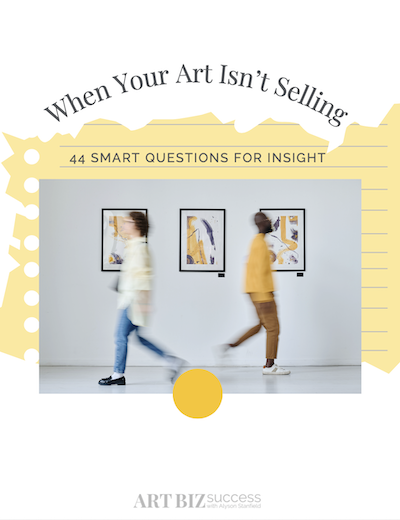A number of my artist-clients are concerned about appearing to be “too commercial” or appearing to promote their art too much.

Deep Thought Thursday
Take your pick:
What does it mean for an artist to be “too commercial”?
Is it possible for an artist to be “too commercial”?
Do you envy people who are bold with their commercial-ness?
What is the upside of commerciality?
What’s the downside?



13 thoughts on “Too commercial?”
I think that, with anything, there’s a fine line between too commercial and not promoting yourself enough. My opinion is that commercialization really happens when you’re no longer making your artwork yourself and/or you may be stuck in a rut, no longer using your creativity to make something new and spectacular. I know artists that have done this, “sold out” per se, and quit being creative all together. Not that we all wouldn’t love to sell out, right?
I think it may have to do with the style in which you present yourself, in terms of both design and content. Tasteful, informative, educational, personal is not felt to be commercial. Loud, aggressive, demanding, in your face is. But it also depends on the attitude of your target audience.
We are a weird society, we want to own everything yet we don’t want to be advertised to yet we remember the commercials better than the show and that’s what we talk to our friends about over dinner. It’s really funny when you think about it.
I tend to be very subtle in my advertising, I put my pots out there in the world and hope people love them as much as I do and take them home. I don’t think this practice offends anyone but I might sell more work if I were more aggressive.
Why do we create. If it is for ourselves ther is no need to be out there. If it is to share and sell then yes you have to promote in ways that you get yourself in front of collectors. You don’t need to have big signs but doing your marketing in a tasteful educated way is the only way you can sell yourself in this envoirnment. I send out emails announcements about new work and my accomplishments all the time. A once a year I have a patron appreciation sale, I don’t consider this to be commercial but rather doing business. I do the art festivals and you have to sell your self and your work all day and to be honest people love to hear about you, your work and why you do what you do. Promoting your self is not a bad thing done in an honest way.
To discover both the limits of commercialism and whether it actually matters, I suggest a study of Andy Warhol. He took commerciallity to new and un-drempt-of heights, while somehow retaining the ‘artiste’ attitude. Damian Hirst has tried something similar, but is losing cachet daily. It’s instructive to note that both artists arose from the advertising biz.
The point to consider is that all art is intended for a market of some kind. Some, like Warhol’s, is intended to be as largely commercial as human effort can make it, while other work is intended for smaller and more focused markets.
Just ran across this on the subject. It’s a good read and infuriating, besides:
http://hyperallergic.com/50226/new-data-reveals-artists-arent-gettin-paid/
From the article: “The fact is that the National Endowment for the Arts (NEA) devotes less than 2% of its meager budget to direct grants to individual artists. State arts agencies spend only 3% of their grant dollars on individual artists. The bulk of philanthropy in the arts goes to only 2% of the nation’s arts institutions, who are among those with the largest budgets. And we know that many of those institutions don’t pay the artists whose work they show. Everybody keeps shifting the responsibility of sustaining artists (the real lifeblood of the arts) to some other group; meanwhile, the money keeps finding its way into the coffers of the few who hold the most power and the purse strings.”
What great comments so far. A great question will do that!
Commercial has different sides to it. Being seen as “too” commercial can also be equated with not being “fine art”. Some might accuse Norman Rockwell of being just a graphics illustrator who did art for magazine covers. That would be one definition of a Commercial Artist. And then there is the recently passed Kinkade; it is estimated that one in 20 households have an object with his art on it. WOW. No denying he was highly commercialized. And rejected by the art elite, but loved by his “collectors”.
With the large graphic in this blog for a “Big Sale”, I also imagine the concern is that being too commercial means treating one’s art more like a commodity than an instrument of influence. As we each try to grow and get more sales, we simply need to be wary of using marketing channels that create a commodity response. And everyone will have a different POV of what that means. For some it will mean never doing computer/printer generated prints. For others it will mean never having a sale. For others it will mean never showing their work at an outdoor fair. But many would argue that getting their art and their name out is the goal and creating buzz and finding collectors today requires more channels – including appearing “too commercial”.
One might ask another question: Is being “too commercial” actually damaging to one’s art career?
love your comments Mckenna!
On the one hand, people who don’t want artists to be “commercial” are either confusing the word, “commercial,” with Wal-mart tackiness, or, they want to be able to not have to feel they have a responsibility to respect artists enough to pay us decently. These are clearly two different topics. I agree we should not be seen as low market disposable quality consumer goods (or services) but on the other hand, Tiffany’s has a geed reputation and they are themselves of necessity “commercial.”
Now for the second topic. We artists have to get out there and sell ourselves, our work, and the idea that art is a necessary component of life itself.
Takashi Murakami…Damien Hirst…Thomas Kinkade…Jeff Koons…What I see is art made by a corporation…These artists employed/employ a huge amount of people to make & print & sell their art…So here’s the rub-would one prefer a car made by a corporation or made by one person? Most people want the corporate car…The works of art made by these corporations are designed to please a myriad of demographics…They are well made, well thought out, & marketed well…I think they are merely part of the fabric that is the art world…I see it as the culture of kitsch…Not a bad thing though…Those lawn gnomes are just as much a part of it as anything else…Those who find it too commercial don’t buy it or like it…That’s ok…Is it too commercial? Well, I find much of the corporate art is not eco-friendly- mass production tends not to be…So I guess when I say something is too commercial, is when I start to worry about the environment…I like one at a time homemade type things because they tend to be easier on the environment…
When I was in art school, it was the “Cinderella Complex”. We could either wait around until someone happened to notice us and appreciate us or we could push forward to market ourselves. In those days, pushing ourselves to market meant sending slide packets out to art galleries. Being “commercial” meant creating art that would sell or was marketable (read into this as you will), rather than creating work that you love.
Jump ahead a bunch of years. I love that artists have taken their careers into their own hands by finding their audiences and marketing their work.
I’m still working on my own technique, but I definitely don’t begrudge other artists from promoting themselves.
I am always struggling with this question, as an artist who does put herself out there in the form of social media, a website, a blog, an e-newsletter, etc. and I ask myself, “Jackson Pollock didn’t do this stuff!”… but then, we live in much different times. The gallery system has changed, our ways of communicating have changed, all bets are off – unless you do the work to put yourself out in the world. I admit, it feels really icky sometimes, but the bottom line is that my marketing has been effective and I don’t think that anyone begrudges me my efforts. I am sometimes complimented on them, in fact!
Still, I can’t help but feel like I’m holding out my hat with a few quarters in it whenever I send out my e-newsletter. I guess it’s that thing in the back of my mind that artists are supposed to starve and have a hard time supporting themselves… I say BULL!
So many contradictory feelings…
I just try to keep moving, looking ahead to new and better opportunities for me and my work. There is nothing wrong with that!
I think there is a very important distinction here, between the art itself, and what you do to promote your art. I think it would be VERY hard, in today’s world, to be “too commercial” in terms of promoting your work. On the other hand, if one lets marketing/sales concerns have too great an influence on the work itself, that is indeed a very different matter. I don’t think there is anything wrong with being aware of what people respond to in your work and what they don’t, but beyond that, I would like to keep these two areas as separate as possible, with “commercial” concerns present only in my marketing/promotional efforts, and banished from the work itself.